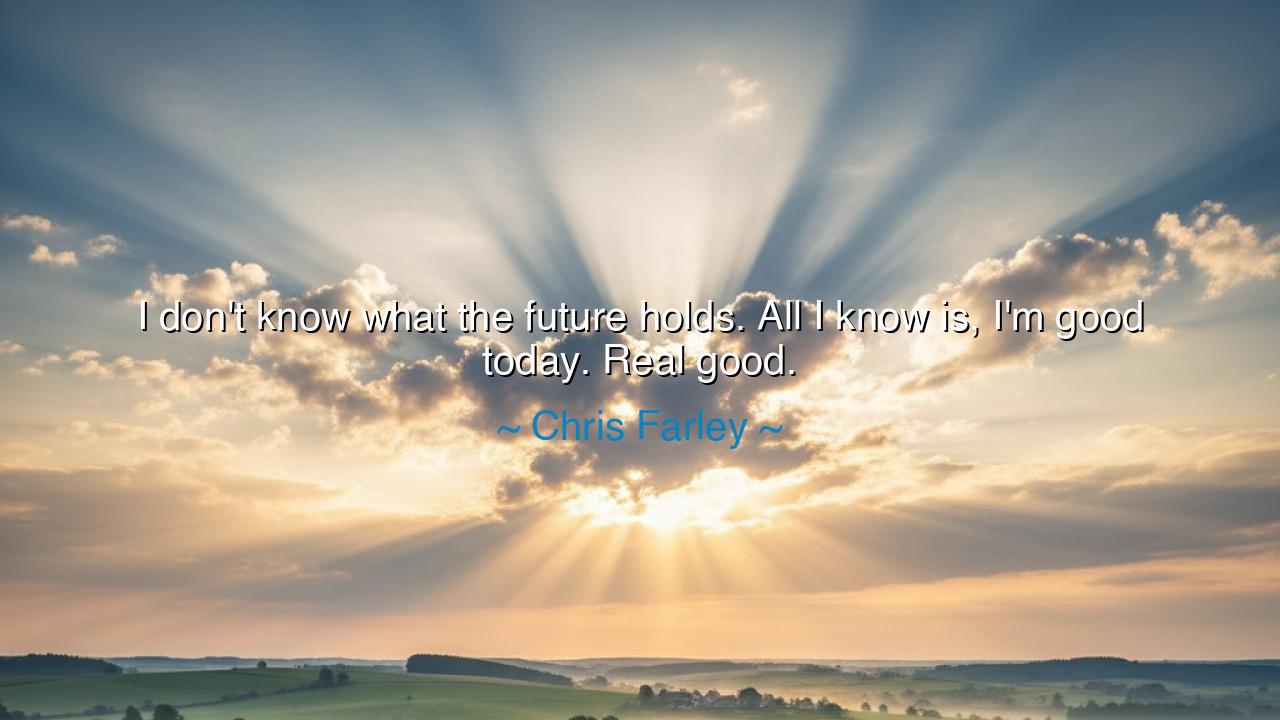
I don't know what the future holds. All I know is, I'm good






“I don’t know what the future holds. All I know is, I’m good today. Real good.” Thus spoke Chris Farley, the jester with a heart of gold, whose laughter filled the world even as his soul wrestled with storms unseen. Though his words seem simple—light, even—they carry the depth of one who knew both joy and sorrow. In them lies a timeless truth: that the only moment truly ours is the present, and that to live fully in it is the highest act of courage. His voice, wrapped in humor, conceals the wisdom of a monk and the gratitude of a soul that, for one shining instant, felt whole.
The origin of this quote emerges from Farley’s own journey—a life that soared to brilliant heights and plunged into shadowed valleys. Beloved for his boundless energy on Saturday Night Live and in films like Tommy Boy, Farley embodied the spirit of joy. Yet behind the laughter was a man who struggled deeply, torn between fame and fragility, success and self-doubt. To say, “I don’t know what the future holds,” was not a confession of defeat, but an act of acceptance—a surrender to the flow of time. And to follow it with, “I’m good today. Real good,” was his victory: a declaration that even amid uncertainty, he could still stand in the sunlight of the present.
This is the wisdom of the moment—a truth that sages have whispered for ages. For what is the future, but a mist that no man can grasp? And what is the past, but a shadow that no longer breathes? The only realm that belongs to us is the now, the sacred ground beneath our feet. Chris Farley’s words echo the teachings of ancient philosophers: from Marcus Aurelius, who wrote, “Do not act as if you had ten thousand years to live,” to the Buddha, who taught that peace comes when one ceases to dwell in what was or what might be. Farley, in his own way, lived that truth—not in temples or palaces, but in the raw theater of existence.
There is a story told of Epictetus, the Stoic slave who became a teacher of kings. When asked how he endured hardship, he replied, “The future is nothing to me. The present is my care.” Like Farley, he knew that power lies not in controlling what comes next, but in embracing what is. Both men, separated by centuries, shared the same divine insight: that the measure of a good life is not the promise of tomorrow, but the quality of today. When Farley said he was “good today,” he spoke as a man who, in that fleeting instant, had found alignment between body and soul.
In this quote, there is also gratitude—the quiet acknowledgment of blessings often overlooked. “I’m good today,” he says, and in that simple phrase there is thanksgiving for the breath in his lungs, the laughter in his heart, the chance to live one more moment. It is the gratitude of a man who, though haunted by demons, still saw light. And that light, fragile yet fierce, is what redeems the human spirit. For even in our darkest hours, there remains the power to say: This moment is mine, and it is enough.
Yet his words also carry a warning, a lesson for all who dwell too much in worry. The future is a seductive illusion—it promises control, but offers none. To live always chasing tomorrow is to forget the gift of today. Farley’s humility before the unknown reminds us that joy is not found in certainty, but in presence. To be “good today” does not mean perfection; it means peace. It means forgiving yourself, laughing despite pain, and choosing to see beauty in the ordinary. This is the alchemy of the human spirit: to turn impermanence into gratitude.
So, my listener, take this as your lesson: do not wait for the future to bless you. Bless yourself now. Do not let your heart be chained by what has not yet come, nor by what has already gone. Each day is a miracle, fleeting and sacred. Wake each morning with the spirit of Chris Farley—not in excess or fear, but in wonder. Say to yourself, as he did, “I’m good today.” Say it even when life trembles, even when you do not feel it fully, and one day it will become true.
For in the end, the future will come as it always does—minute by minute, hour by hour—but happiness belongs to those who can stand still in the river of time and smile at the sunlight upon its surface. “I don’t know what the future holds. All I know is, I’m good today. Real good.” In that single line lies a philosophy for the ages: live now, love now, be grateful now—and let tomorrow find you ready, not waiting.






AAdministratorAdministrator
Welcome, honored guests. Please leave a comment, we will respond soon